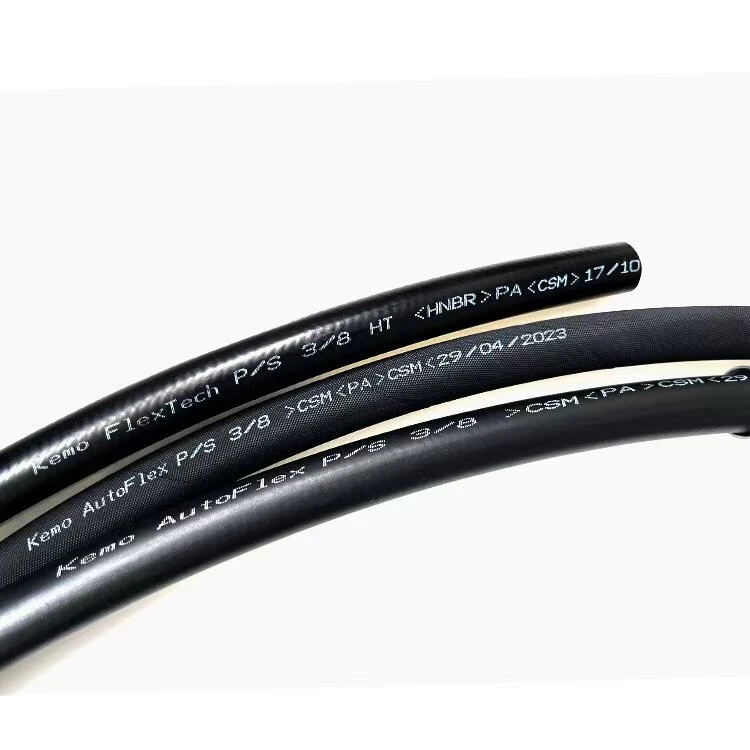Flexible Rubber Hoses for Efficient Fuel Line Applications and Performance
ഡിസം . 25, 2024 19:20 Back to list
Flexible Rubber Hoses for Efficient Fuel Line Applications and Performance
The Importance of Rubber Hose for Fuel Lines A Comprehensive Overview
In the world of automotive engineering and maintenance, the components that make up fuel systems are crucial for the efficient operation of vehicles. Among these components, rubber hoses play an indispensable role, especially when it comes to fuel lines. This article delves into the significance of rubber hoses for fuel lines, exploring their properties, applications, maintenance, and the future of materials used in fuel delivery systems.
Properties of Rubber Hoses
Rubber hoses are favored in fuel line applications because of their unique properties. Firstly, they exhibit excellent flexibility, allowing them to conform to various shapes and sizes within the engine compartment. This flexibility is vital as fuel lines often need to navigate tight spaces and intricate layouts.
Another important property of rubber hoses is their resistance to temperature fluctuations. Fuel lines are subjected to significant heat generated by the engine, and rubber hoses can maintain their integrity under varying thermal conditions. Additionally, modern rubber hoses are engineered to resist the corrosive effects of fuels, oils, and other automotive fluids. This chemical resistance ensures longevity and reliability, critical factors for any vehicle component.
Applications in Fuel Systems
Rubber hoses are predominantly used in fuel delivery systems in a variety of vehicles, including cars, trucks, and motorcycles. They transport fuel from the tank to the engine, ensuring a smooth and efficient flow. The reliability of these hoses is paramount, as any failure can lead to fuel leaks, which are not only inconvenient but can also pose significant safety risks, including fire hazards.
Moreover, rubber hoses are utilized in high-performance vehicles where enhancing fuel delivery efficiency is crucial. In these applications, specialized rubber formulations may be employed to withstand higher pressures and temperatures, ensuring the vehicle can perform at its best.
Maintenance of Rubber Fuel Hoses
rubber hose for fuel line

Regular maintenance of rubber hoses is essential for ensuring the longevity and safety of the fuel system. Vehicle owners are encouraged to inspect their fuel lines periodically for signs of wear, such as cracking, swelling, or discoloration. These indicators are critical warning signs that a hose might be nearing failure.
When performing maintenance, it's an opportune time to check for leaks along the fuel line. Even small leaks can lead to significant fuel loss and create hazardous situations. If any damage is detected, it is crucial to replace the affected hose promptly to maintain the fuel system's integrity.
Additionally, ensuring that the hoses are properly secured and free from kinks or sharp bends can prevent unnecessary stress and prolong their life. While rubber hoses can handle a degree of flexibility, excessive bending can lead to pre-mature fatigue.
The Future of Rubber Hoses
As technology advances, the materials used in automotive applications are constantly evolving. While rubber remains the material of choice for many fuel lines due to its versatility and performance, advancements in synthetic rubber composites and alternatives, such as thermoplastic elastomers, are gaining traction. These newer materials can offer improved durability, reduced weight, and enhanced resistance to aggressive fuels.
Sustainability is also becoming an essential consideration in the manufacturing of automotive components. The industry is witnessing a shift towards greener materials, which are designed to minimize environmental impact while maintaining high-performance standards.
Conclusion
In summary, rubber hoses are a fundamental component of fuel line systems in vehicles, offering flexibility, chemical resistance, and durability. Their role in ensuring the reliable transport of fuel cannot be understated, as they contribute significantly to vehicle performance and safety. Regular maintenance and timely replacement of worn hoses are crucial practices for vehicle owners to adopt. As the automotive industry continues to innovate, the future of rubber hoses is likely to see exciting developments that enhance both performance and sustainability, ensuring that they remain a vital part of automotive engineering for years to come.
Latest news
-
Durable Automotive Fuel Line: Car, Diesel & E85 Hoses
NewsAug.27,2025
-
Automotive Fuel Line & Hose Solutions | E85 & Diesel Ready
NewsAug.26,2025
-
Reliable Automotive Fuel Line | E85 & Diesel Compatible
NewsAug.25,2025
-
Durable Car Heater Hose | Quality Automotive Preheater Pipes
NewsAug.24,2025
-
Durable Air Brake Hose & Air Lines for Trucks | Safety Ensured
NewsAug.23,2025
-
Air Conditioning Charging Hose: Durable AC Recharge Kits
NewsAug.22,2025
